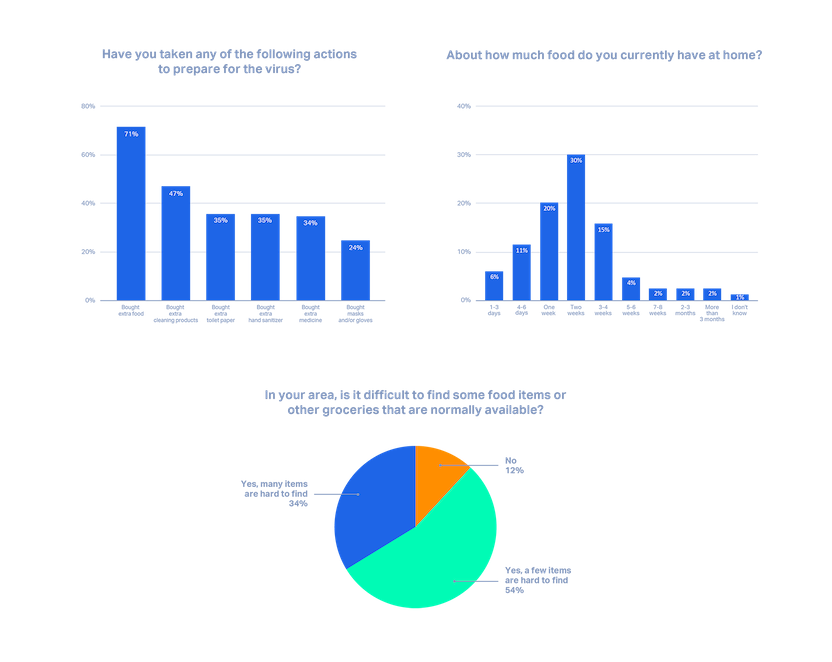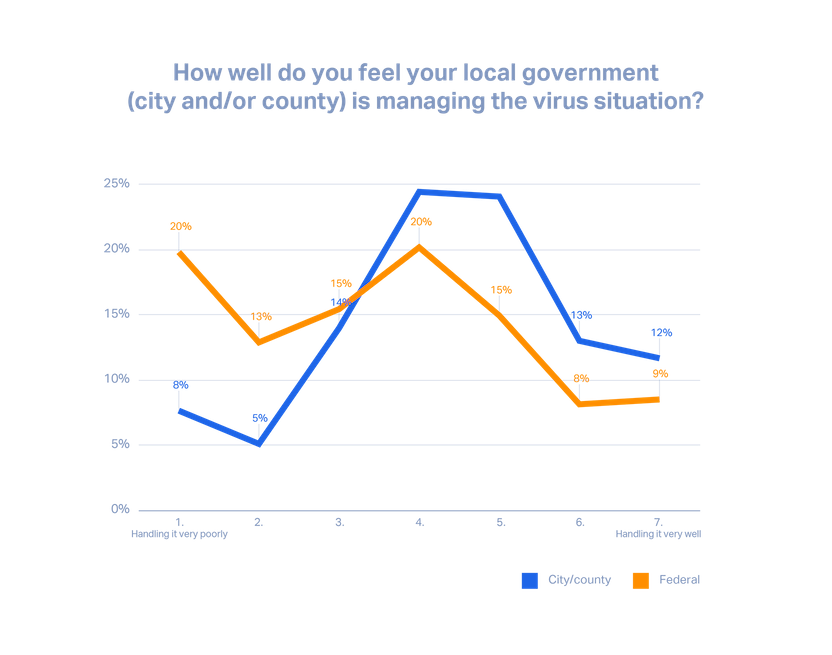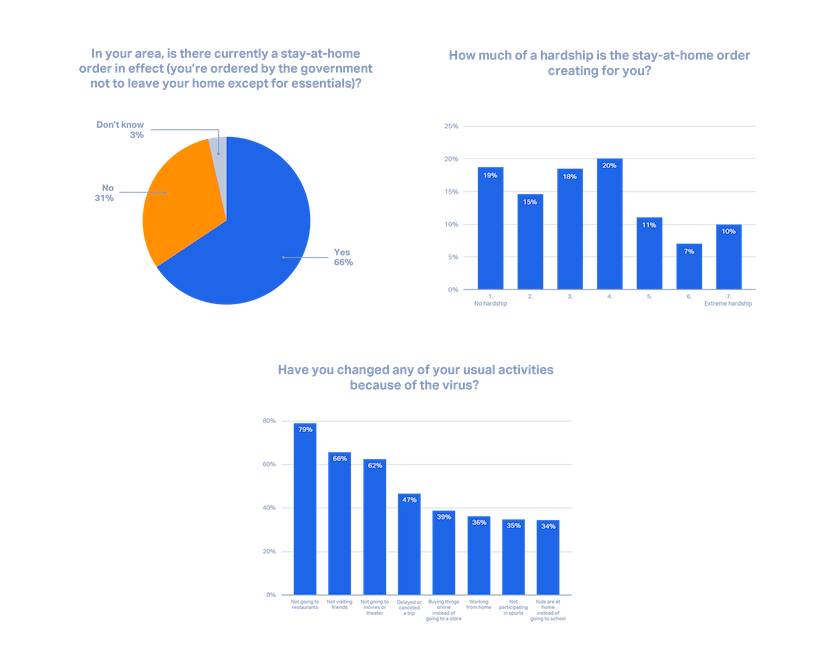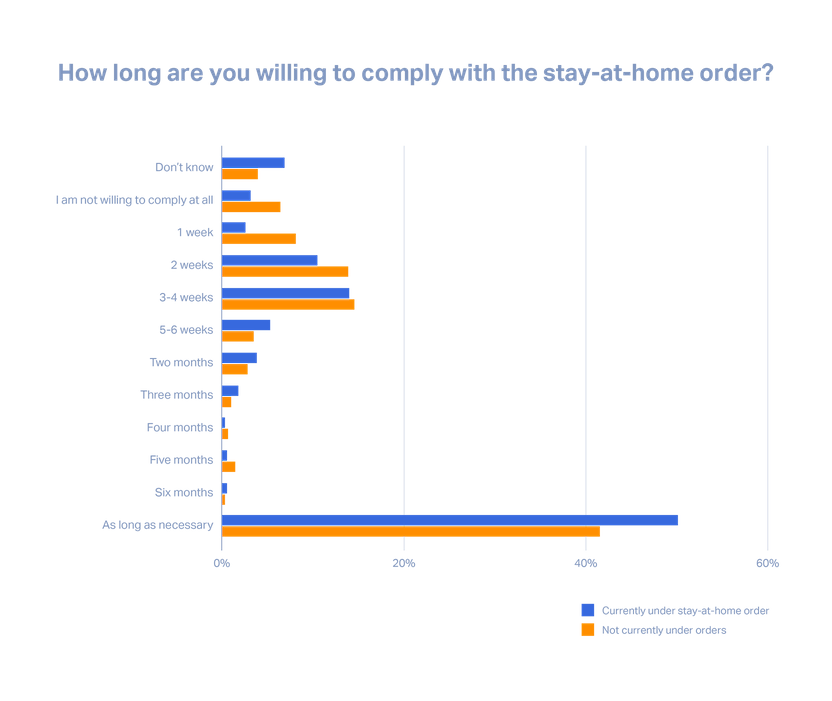
Public attitudes, behaviors, and reactions across the US to COVID-19: a UserTesting study

We’ve all recently been impacted by the virus, but to what extent varies from person to person. The United States is large—spanning four time zones, ranging in socio-economic status, and varying from rural areas to densely packed cities—so the impacts are felt differently across the country. Which has us wondering: how are people reacting and responding to this whole thing?
How satisfied or unsatisfied are the American people with the government's response to the pandemic? Are Americans worried more about the virus or economic stressors? How have their lives changed? Are businesses and people overreacting? Underreacting? Do Americans feel helpless? Supported?
The list goes on. Which is why we ran a national survey paired with online interviews, so we could better understand the full story: not just what’s happening, but why people are reacting the way they are, and how they ultimately feel about their situation overall.
Research highlights
It’s important to note that the general tone of the country is worried and emotional, but resilient. Not surprisingly, in many of the comments throughout the study, there were strong emotional overtones.
Here are some of the insights that emerged:
- The majority of Americans simply want others to comply with restrictions.
- There’s a yearning for togetherness and compassion. Many people reported that those around them are cooperating to deal with the situation.
- There were two common complaints: hoarding of goods (especially toilet paper) and that people are not complying with social distancing, going on vacations, etc. Some of the respondents said they were alarmed by posts from these others on social media.
- A small number of people (roughly 5% of the population) do not believe the virus is a serious problem and are strongly resistant to everything that is being done about it.
Hear what Americans’ would like to say to the country about COVID-19:
Methodology
UserTesting conducted a survey with 841 participants on March 23, 2020, and the remote interviews were all conducted in the week around that time.
Participant demographics:
- Currently living in the United States
- Randomly selected
- Balanced for age, region, gender, and income
There were 800 survey respondents and 41 self-guided interviews. The margin of error is +/- 4 percentage points.
Research findings
In order to paint a complete picture of the nation’s reactions to the coronavirus, it’s important to move beyond data (alone), by coupling it with real human reactions. Throughout the remainder of this post, we encourage you to not just read the statistics but watch the videos to learn how people feel and why they answered the way they did.
Before we move on to our detailed analysis, here are some quantitative highlights that emerged:
- Most Americans expressed a strong willingness to sacrifice to fight the virus, and a deep desire for mutual support and cooperation.
- About 66% of Americans prioritize fighting the virus over preventing a recession.
- About 50% of Americans say they are willing to stay at home for “as long as it takes” to slow the spread of the disease.
- Although most Americans report that they’re not experiencing serious hardships due to the situation, about 11% of Americans say they’re already having serious problems, primarily because they can’t work or are feeling extremely isolated.
- About 33% of Americans report shortages of many grocery items. Almost everyone mentions supplies of toilet paper as a problem.
- About 5% of Americans feel the virus is not a significant threat and that the entire situation has been overblown.
Research findings:
- Concerns about the virus
- Stop the spread vs. protect the economy
- Overreacting or underreacting
- Finding trustworthy information about the virus
- Preparation and readiness
- Confidence in government (federal and local)
- Reactions to stay-at-home orders
Concerns about the virus
Most Americans are very worried about the virus, but they’re not all worried about the same things:
- Some are more worried about health issues, including vulnerable relatives.
- Some are more worried about the economy.
Listen to their worries:
Stop the spread vs protect the economy
When forced to choose between two options, fighting the virus was overwhelmingly a higher priority than stopping a recession. Approximately 66% of Americans favor fighting the virus, 20% favor preventing a recession, and 15% are in the middle.
Hear how Americans view the tradeoff between economy and health:
Overreacting or underreacting?
Americans are of two minds on this issue. They say:
- Many people are overreacting by panic-buying groceries.
- Many people are underreacting because they don’t take social distancing seriously.
Hear Americans’ concerns about how others are reacting:
Finding trustworthy information about the virus
Participants cited doctors, scientists, and federal health agencies as the most trusted sources for information on the virus because they are viewed as well-informed and nonpartisan. Many people go first to health agencies when searching online for virus information. Here’s how the other sources stack up:
- The press, employers, schools, and friends are moderately trusted sources of information because they’re viewed as potentially biased by partisan and personal opinions.
- Facebook and Twitter are the least trusted sources because they are seen as forums for opinion rather than objective information.
- The view of the President is split. He’s highly trusted as a source of virus information by most Republicans, while he is highly distrusted as a source by most Democrats and independents. For the country as a whole, he is both one of the five most trusted sources and one of the three least trusted sources.
Listen as Americans explain which sources they trust and why:
Preparation and readiness
Most people tried to prepare for the virus, but for many of them, supply problems got in the way:
- About 70% bought extra food and half bought cleaning products.
- Only 33% of Americans bought extra hand sanitizer and toilet paper, but many of the people who didn’t buy said it was because they sold out before they had a chance to get any. (Incidentally, this means panic buying by about a third of Americans was enough to deplete the country’s entire retail supply of toilet paper.)
- On average, people have roughly two weeks of food at home.
- About 33% of Americans report that it’s hard to find many grocery items, while about half say there are shortages of a few items.
Listen to Americans discuss their preparation and frustrations:
Confidence in government
Americans varied greatly when rating how their governments are handling the virus situation. Overall, local governments were rated a bit better than the federal government.
- Local governments (city and county) received favorable ratings from about half of Americans.
- About a third of Americans gave favorable ratings to the federal government.
- One prominent complaint about the federal government was the delays in the passage of a relief bill. (The bill was passed just after the survey was completed.)
Listen to Americans describe their views of the government response:
Reactions to stay-at-home orders
Two-thirds of Americans said they are subject to a government stay-at-home order—an order not to leave home except for food and other essentials.
Across the country, these orders are affecting people differently:
- Most people say staying at home is a low to moderate hardship. Most of them have jobs that let them work at home, or have other financial resources.
- However, 17% of the people under stay-at-home orders are already experiencing serious hardships. (That’s about 11% of the US population.) Most of those people have lost jobs, can’t work, or are feeling extremely isolated.
Listen to the hardships some Americans are experiencing:
Willingness to comply with restrictions is varied. About half the country says they are willing to stay at home for as long as it takes to beat the virus. Among the rest, the average time they are willing to be confined is 2-4 weeks.
The resistance to staying home is driven by several reasons:
- Some people don’t believe the situation is serious.
- Some people need to get back to work for financial reasons.
- Some people are willing to stay at home voluntarily but don’t want to be given orders.
Wage and salary also contribute to opinions:
- People with high incomes were a bit more willing to stay at home for longer periods.
- About 40-50% of lower-income people were willing to stay at home for as long as it takes, while around 60% of higher-income people were willing to do it.
Watch Americans discuss their willingness to shelter at home:
What it all means for businesses
At the end of the day, everyone’s customers are being impacted by the coronavirus. Although the immediate impact is greater on some industries, such as healthcare and travel, everyone is experiencing economic pain, and everyone’s customers are on edge. People are looking to companies to help them get through the crisis. Here’s what you can do to help:
- Show compassion, cooperation, and supportiveness. Many people are yearning for a feeling of togetherness and mutual support.
- People are in very different emotional states and are worried about different aspects of the situation, so be sure to test your messaging very carefully. It’s easy to offend people by accident.
- Focus on practical things your company can do to help others. This is not the time for competitiveness and enthusiastic chest-beating promotions.
- Don’t communicate for the sake of it. Some participants complained about generic “we’re fighting the virus” emails from companies. Ask yourself if what you’re saying is unique, brings people together, and helps them solve real problems. If it doesn’t pass those tests, don’t press send.
We’ll be publishing more research on the virus situation in future weeks. In the meantime, let us know if you have questions, or ideas that you’d like to see researched. And stay safe.
In this Article

Webinar: New consumer insights amidst COVID-19
Webinar: New consumer insights amidst COVID-19







